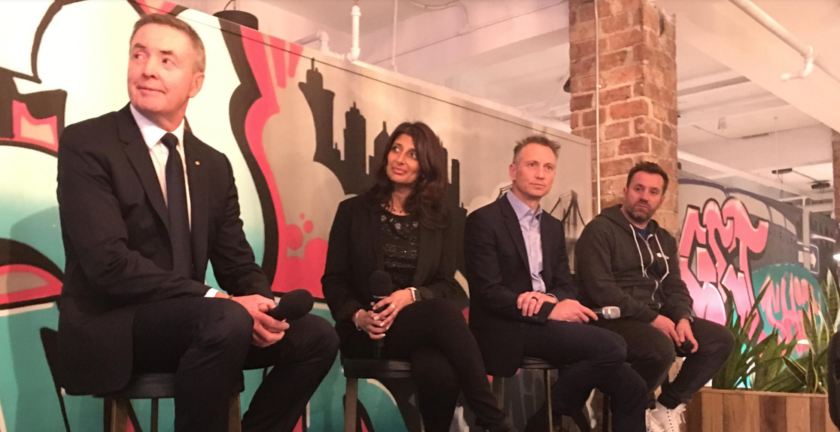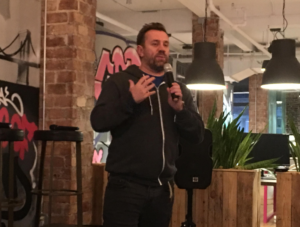M+E Connections

LiveTiles CEO: AI Can Eliminate the ‘Boring’ Tasks
Story Highlights
NEW YORK — Artificial intelligence (AI) presents many opportunities to companies across a wide range of industries willing to embrace it, but the technology must be implemented correctly and with enough data for it to make sense, according to executives at cloud-based intelligent workplace software company LiveTiles and Microsoft.
“The world is changing,” LiveTiles CEO Karl Redenbach said March 20 during a panel presentation called “How to Introduce Artificial Intelligence (AI) To the Enterprise.” That change is not happening only “through robotics [and] not through just the way that digital is working, but also through the way” in which computers are learning to do more and more tasks now being done by humans, he said, adding: “Tomorrow, they might be able to do [those things] better than you.”
And “a lot of great things can happen in humanity through that,” he told attendees. For one thing, it can eliminate “some of the most boring tasks you’re doing … stuff that you don’t want to do,” such as filling out and submitting forms, which AI can handle instead, he said.
In recent years, we’ve been seeing the popularity of a basic form of AI used for language understanding via devices that use the Alexa and Siri platforms, he noted.
But “the real technical part of AI … is when you can get some knowledge” from the technology’s use, he said. For example, a surgeon or another doctor who is “very highly skilled can implement something that may have taken many, many years to implement – and that’s where I think the real…intelligence part if it comes to fruition,” he said.
 Later in the presentation, he told attendees: “Probably the most exciting thing we’re doing right now” is LiveSmiles, a project addressing wellness for the workplace that is “about to go live, at the end of April.” The company spent a year and a half on the project, which uses AI “to make people happier in the workplace – to make work not so boring,” he said.
Later in the presentation, he told attendees: “Probably the most exciting thing we’re doing right now” is LiveSmiles, a project addressing wellness for the workplace that is “about to go live, at the end of April.” The company spent a year and a half on the project, which uses AI “to make people happier in the workplace – to make work not so boring,” he said.
LiveSmiles is a “free intelligent wellness solution” that the company will be launching “globally,” according to the LiveTiles Web site, which adds: “We will be sharing more information on LiveSmiles soon, but we need your help to turn broad awareness of the movement into a genuinely engaging solution for employers and employees alike. Whether you’re interested in LiveSmiles for your [organization], partnering with us, or simply want to contribute and help shape the solution – please be sure to register your interest” at the site.
Redenbach also touted his company’s AI collaboration with Microsoft during the panel presentation and told attendees: “We’re working with some of the biggest companies in the world” to embed “cobots”— “collaborative, co-working robots that work alongside humans.”
He predicted that the number of cobots used by organizations will grow. But that doesn’t necessarily mean there will be major job losses, he noted, saying “the world will be a much easier place to work” in as a result.
Agreeing with him, Priya Gore, global AI sales and strategy lead at Microsoft, said a cobot is “not meant to replace – it’s meant to augment; it’s meant to increase the power of individuals doing work in meaningful ways” and even lead to “better outcomes” in the medical and insurance sectors.
Microsoft, in general, is helping its clients try to understand that “this is really a moment in humanity for us all to really either … get on or off the train and embrace and figure out how we’re going to augment our own culture to employ AI into the ecosystem of our company.” She added: “That becomes then, I think, the door opener to… think big, but start small” with AI.
An organization can think about the “highest value opportunity to engage and infuse AI into a workflow — a business process,” or it can maybe “use conversational AI in bots to amplify your brand and start meeting your customers where they’re at,” she said.
But employees “have to trust” AI if you’re using the technology, so it’s a good idea to get them comfortable with the technology first, she said, calling the implementation of AI a “journey” in which “you don’t have to go big bang” with AI out of the gate.
She suggested that an organization select a use case for AI and make sure it has enough data around it for the technology to be used effectively, adding it’s important to not just use technology for the sake of using it.
Earlier in the presentation, she pointed out that Microsoft looks for opportunities in which its clients across multiple industries can conceivably use AI. Microsoft is looking for those customers “looking to innovate” and “be next-generation disruptors in the business that they’re in,” she said, adding that, with AI, “a lot of the work that we do is actually not so much about the technology upfront.” Rather, she said: “It’s about really gearing the culture of that organization to get ready for this type of positive disruption that’s ahead of them.”
But she cautioned: “None of this matters if two things aren’t present,” and that’s the client being “ready to embrace change” and there being “really good data.” After all, she said: “Data is the oxygen for AI…. Without data, none of the AI intelligence system stuff really matters.”
Also taking part in the panel discussion, which was presented by LiveTiles and Monash University, were Greg Baxter, chief digital officer at insurance company MetLife, and Professor Ian Meredith, global chief medical officer and EVP at Boston Scientific.









